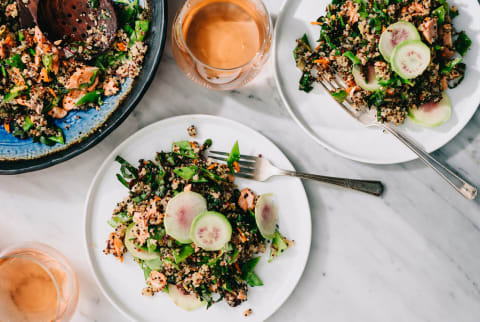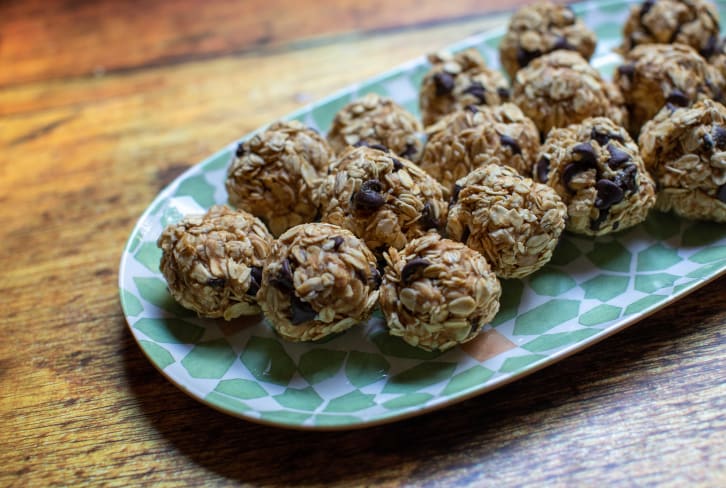Advertisement
These Are The 3 Best Mood-Boosting Foods


Post daylight saving time ending, the 5 p.m. darkness can cause the reality of winter to really set in—and along with it, the pervasive SAD, or seasonal affective disorder, that affects hundreds of thousands of people. We asked Dale Pinnock, the Medicinal Chef and author of Eat Your Way to Happiness, to share his top three foods to fend off the winter blues. Here are his picks.
1. Oily fish.
Oily fish are definitely top of my list of foods that influence mood. This is due to the presence of omega-3 fatty acids, one of the most widely studied nutrients in the context of brain and neurological health. Omega-3 fatty acids are a vital component of neuronal membranes, specifically the myelin sheath, a specialized capsular structure that runs along the length of the neuron (nerve cell). The myelin sheath is vital for conveying nerve signals.
Omega-3 fatty acids go a step further by maintaining the function of neurotransmitter receptors. They help to keep the membranes around receptor sites fluid and supple. A study1 of around 4,000 Finnish nationals showed that the more fish they consumed, the lower their risk of depression and suicidal tendencies was. Another study2 found that fish consumption was significantly associated with higher self-reported mental health status (meaning an individual's personal perception of mood and outlook). I recommend people add two to three portions of oily fish such as mackerel, sardines, salmon, or herring weekly.
2. Turkey.
This unlikely sounding food is on this list because of its high tryptophan content. Tryptophan is an amino acid that is the metabolic precursor to the neurotransmitter serotonin, which controls elements of bone metabolism, localized aspects of gut function, and makes us feel good. Serotonin is the feel-good chemical that keeps us happy and upbeat and keeps our moods stable. Serotonin also regulates our appetite and sleep patterns and is involved in memory and sexual desire. A deficiency of serotonin has been linked to depression3, and serotonin levels and availability in the nervous system is a major target in drug therapy for depression. Serotonin also helps regulate sleep patterns.
3. Whole grains.
I recommend whole grains because they're rich in B vitamins, one of the most important groups of nutrients for short- and long-term neurological health. B1 is involved in turning glucose into energy—low levels can lead to feeling tired and sluggish. It can also make us mentally tired and affect concentration and overall mental performance. Vitamin B3 has a long-standing association with mental health, since its deficiency illness, pellagra, was understood. Sufferers of pellagra get a thick, scaly skin rash on exposure to sunlight, but they also get depression, disorientation, and apathy.
B3 has been used in several studies4 in the treatment of schizophrenia and has also shown promise in improving memory in both the young and old. Vitamin B5 is needed to make the neurotransmitter acetylcholine, which is important for memory and learning. Vitamin B6 is an incredibly important nutrient for mental health for two distinct reasons. It's a key nutrient involved in the formation of myelin, that super-conductive sheath that carries signals rapidly across the axon. It also helps convert the amino acid tryptophan into the neurotransmitter serotonin, the aforementioned feel-good compound.
Vitamin B12 is also showing some potential links to mental health, although the reasons behind this are slightly less clear than other B vitamins. One theory is that B12 is involved in the production of a type of neurotransmitter called monoamines. These are involved in emotion, cognition, and arousal. It is also thought that, in combination with vitamin B6 and folic acid, B12 can reduce levels of an amino acid called homocysteine, which can cause damage to the brain and cardiovascular system.
Bonus: Green vegetables.
I know green vegetables are hailed as a basic cure-all, but I added them as a bonus to this list with good reason. They're packed with magnesium, which makes up part of chlorophyll. Magnesium is involved in over 1,000 chemical reactions in the body, and it helps relax the muscles and the nervous system. I recommend people pack as many greens into each of their meals as possible.
Curious what kind of impact food can have on your mood? One writer ate an anti-anxiety diet for a week—here's what happened.
Watch Next
Enjoy some of our favorite clips from classes
Enjoy some of our favorite clips from classes
What Is Meditation?
Mindfulness/Spirituality | Light Watkins
Box Breathing
Mindfulness/Spirituality | Gwen Dittmar
What Breathwork Can Address
Mindfulness/Spirituality | Gwen Dittmar
The 8 Limbs of Yoga - What is Asana?
Yoga | Caley Alyssa
Two Standing Postures to Open Up Tight Hips
Yoga | Caley Alyssa
How Plants Can Optimize Athletic Performance
Nutrition | Rich Roll
What to Eat Before a Workout
Nutrition | Rich Roll
How Ayurveda Helps Us Navigate Modern Life
Nutrition | Sahara Rose
Messages About Love & Relationships
Love & Relationships | Esther Perel
Love Languages
Love & Relationships | Esther Perel
What Is Meditation?
Box Breathing
What Breathwork Can Address
The 8 Limbs of Yoga - What is Asana?
Two Standing Postures to Open Up Tight Hips
How Plants Can Optimize Athletic Performance
What to Eat Before a Workout
How Ayurveda Helps Us Navigate Modern Life
Messages About Love & Relationships
Love Languages
Advertisement

These Peanut Butter Cup Protein Bites Make The Perfect On-The-Go Snack
Molly Knudsen, M.S., RDN










